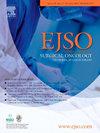Enhanced recovery and comparable long-term outcomes in reduced-port robotic distal gastrectomy versus conventional laparoscopic distal gastrectomy: A propensity score-matched analysis of single-center experience
IF 3.5
2区 医学
Q2 ONCOLOGY
引用次数: 0
Abstract
Introduction
Reduced-port robotic distal gastrectomy (REPRODG) combines reduced-port surgery with robotic assistance to further optimize surgical outcomes. While the advantages of both reduced-port and robotic approaches over conventional laparoscopic surgery remain controversial, evaluating these techniques together may reveal potential benefits not observed when assessed separately. This study aimed to compare the surgical and oncologic outcomes of REPRODG to those of conventional laparoscopic distal gastrectomy (CLDG).
Materials and methods
We conducted a retrospective analysis of 1865 patients with gastric cancer who underwent either REPRODG or CLDG between January 2015 and December 2018. Utilizing 1:1 propensity score matching, we compared short- and long-term outcomes between the groups.
Results
A total of 174 matched pairs of REPRODG and CLDG patients were analyzed. The REPRODG group demonstrated a shorter hospital stay (p = 0.006) and faster time to the first flatus (p = 0.001), and a lower incidence of pulmonary complications (p = 0.044) compared to the CLDG group. No significant differences were observed in overall and recurrence-free survival between the two groups (p = 0.739 and 0.564, respectively).
Conclusions
This study suggests that REPRODG may provide better short-term surgical outcomes to CLDG, particularly faster postoperative recovery, while maintaining comparable oncologic outcomes. Integrating robotic technology into reduced-port distal gastrectomy may further optimize postoperative recovery.
微创机器人远端胃切除术与传统腹腔镜远端胃切除术相比,恢复能力增强,长期疗效可比:单中心经验的倾向评分匹配分析
复位机器人远端胃切除术(repdg)将复位手术与机器人辅助相结合,进一步优化手术效果。虽然与传统腹腔镜手术相比,缩小手术口和机器人手术方式的优势仍然存在争议,但将这些技术一起评估可能会发现单独评估时无法观察到的潜在益处。本研究旨在比较recdg与传统腹腔镜下远端胃切除术(CLDG)的手术和肿瘤预后。材料与方法我们回顾性分析了2015年1月至2018年12月期间1865例接受了redg或CLDG治疗的胃癌患者。利用1:1的倾向评分匹配,我们比较了两组之间的短期和长期结果。结果共分析了174对配对的redg和CLDG患者。与CLDG组相比,redg组的住院时间更短(p = 0.006),第一次放屁时间更快(p = 0.001),肺部并发症发生率更低(p = 0.044)。两组患者的总生存率和无复发生存率差异无统计学意义(p分别为0.739和0.564)。结论:本研究表明,与CLDG相比,redg可以提供更好的短期手术效果,特别是更快的术后恢复,同时保持可比较的肿瘤预后。将机器人技术整合到远端胃切除术中可以进一步优化术后恢复。
本文章由计算机程序翻译,如有差异,请以英文原文为准。
求助全文
约1分钟内获得全文
求助全文
来源期刊

Ejso
医学-外科
CiteScore
6.40
自引率
2.60%
发文量
1148
审稿时长
41 days
期刊介绍:
JSO - European Journal of Surgical Oncology ("the Journal of Cancer Surgery") is the Official Journal of the European Society of Surgical Oncology and BASO ~ the Association for Cancer Surgery.
The EJSO aims to advance surgical oncology research and practice through the publication of original research articles, review articles, editorials, debates and correspondence.
 求助内容:
求助内容: 应助结果提醒方式:
应助结果提醒方式:


